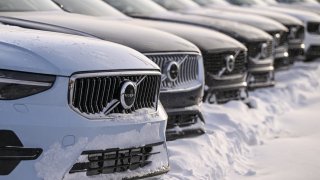- Volvo Cars is widely considered as one of the most exposed European carmakers to U.S. tariffs.
- The Sweden-based automaker on Thursday posted a sharp drop in second-quarter operating profit, citing an ongoing challenging environment for the industry.
- It comes shortly after Volvo Cars launched plans to add its best-selling XC60 sports utility vehicle to the production line of its U.S. car plant in Ridgeville outside Charleston in South Carolina.
Shares of Sweden-based automaker Volvo Cars rose as much as 10% on Thursday as the company’s second-quarter operating profit beat analyst expectations despite a sharp year-on-year decline.
Stream San Diego News for free, 24/7, wherever you are with NBC 7.
Volvo Cars, which is owned by China’s Geely Holding, on Thursday
reported
that second-quarter operating profit excluding items affecting comparability fell to 2.9 billion Swedish kronor ($297.83 million), down from 8 billion during the same time last year.
Second-quarter revenue dropped to 93.5 billion kronor, compared to 101.5 billion kronor over the same period in 2024.
Get top local San Diego stories delivered to you every morning with our News Headlines newsletter.
Volvo Cars, which is widely considered as one of the most exposed European carmakers to U.S. tariffs, said the result reflects an ongoing challenging environment for the automotive industry. The company said it was also impacted by a
previously announced
one-off non-cash impairment charge of 11.4 billion kronor.
Despite the downbeat sentiment, Volvo Cars’ second-quarter figures were still better than anticipated, analysts at JPMorgan said in a research note.
Shares of Volvo Cars were last seen trading up 8%. The stock price remains down around 20% year-to-date.
Money Report
Disney’s spent 70 years funneling IP into its theme parks. Here’s why it works
Crypto accumulator DeFi Development to expand globally by franchising its Solana treasury model
The second-quarter earnings come shortly after Volvo Cars
launched
plans to add its best-selling XC60 sports utility vehicle to the production line of its U.S. car plant in Ridgeville outside Charleston in South Carolina.
Production of the XC60, which has been the firm’s best-selling model globally for years, is scheduled to start at the factory in late 2026.
At the same time, Volvo Cars has started pulling sedans and station wagons from its U.S. portfolio amid waning interest,
Reuters reported
Thursday. It comes as U.S. tariffs of 27.5% on European-made cars and 100% on EVs imported from China have forced automakers to review their product strategies.
Volvo Cars CEO Håkan Samuelsson said the company would “definitely not” pull out of the U.S. market, where it has been present for 70 years.
“What we are doing is first of all, we want to fill our factory we have in South Carolina. It should be the strategic asset it was intended to be. So, we have to utilize it more,” Samuelsson told CNBC’s ”
Europe Early Edition
” on Thursday.
“Second, of course, now with the tariffs, it is very natural to bring in a [car model with] big-selling volume. We are bringing in the XC60 SUV,” he added.
Also on CNBC
-
Stocks making the biggest moves after hours: United Airlines, Sarepta and more
-
United Airlines issues new 2025 forecast as CEO says ‘world is less uncertain’
-
We’re raising our Goldman price target after a solid quarter, strong deal outlook







